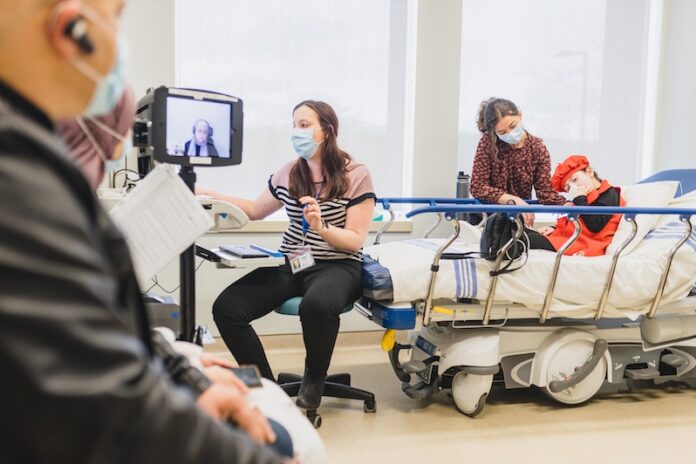Accessing Canada’s health-care system can be a frightening and stressful experience for those with a language barrier. For patients and their families who are not proficient in English, they may struggle to express their concerns and symptoms and to understand medical terminology. This can lead to misunderstandings, frustration and even a lack of trust between patients and health-care providers.
“People are at their most vulnerable state when trying to access health services, and the inability to speak in their native tongue to clinicians is an incredibly challenging barrier,” says Ted Scott, chief innovation officer at Hamilton Health Sciences (HHS). “So, we’re excited that Voyce can help us overcome this barrier and create a more seamless experience when accessing health care in our community.”
A communication solution
As one of Ontario’s largest and most comprehensive health-care organizations, HHS recognizes the importance of equity, diversity, and inclusion in delivering exceptional care to our diverse community of 2.3 million people. When it comes to interpretive services, HHS previously relied on in-person interpreters or phone services, however, they were time-consuming and often unavailable in a timely manner.
“Improving communication is essential to us as an organization that’s on a mission to provide ‘best care for all,’ says Scott. “Voyce was identified as an opportunity to serve our community better, but we needed to evaluate it in our organization to understand where and how we could best use this service.”
Ontario Bioscience Innovation Organization (OBIO®), a not-for-profit organization dedicated to advancing health technology innovation and commercialization, facilitated a partnership between HHS and Voyce Canada. This Toronto-based technology-driven company offers a language interpretation solution. Through this partnership, HHS is evaluating Voyce’s medical interpretation platform.
To access Voyce, patients and their care team simply need an internet connection and a device such as a smartphone or tablet. There is a diverse network of 2,000+ qualified interpreters in more than 240 languages who are trained in medical terminology, with an average connection time of less than 30 seconds.
Removing the language barrier
Voyce has been deployed at HHS in select units representing a variety of settings including an emergency department, inpatient and outpatient units. This allows any adoption barriers to be assessed before full implementation is considered not only within HHS but across any other health-care organization.
“Having the Voyce translation service really helps to promote allyship and inclusivity for a lot of our families who don’t speak English,” says Dr. Audry Lim, Pediatrician and Medical Lead of Complex Care at HHS McMaster Children’s Hospital (MCH). “Without the ability to interpret properly and timely, I find that it really impedes the care we can provide. But, by pulling Voyce into the room I can communicate with the families in real-time without any translation issues. It really helps to reassure the family and answer their questions immediately.”
By providing real-time interpretation services, care teams can ensure that patients and families can fully understand their medical conditions, treatment options, and instructions for follow-up care.
Aisha and Mahmoud Jomaa’s daughter Aline is a patient at MCH with multiple specialists including Dr. Lim. They have been able to utilize Voyce since the pilot began.
“I know that with Aline’s condition, we need to come to the hospital a lot, so it’s very comfortable for me to have this service,” says Aisha. “Whatever I’m saying, I’m sure that it’s being relayed, no matter how I’m expressing it, in the same way. It feels like I’m the one who is speaking.”
Voyce for all
Patients, staff and physicians have had extremely positive feedback on Voyce, so HHS has currently extended the pilot while it works on securing it as a standard service that can be accessed organization-wide.
“We’re also going to extend the service into our research and education areas as well, to help us better understand the needs of our non-English speaking community,” says Scott.
He continues to say, “Voyce is game-changing.”


